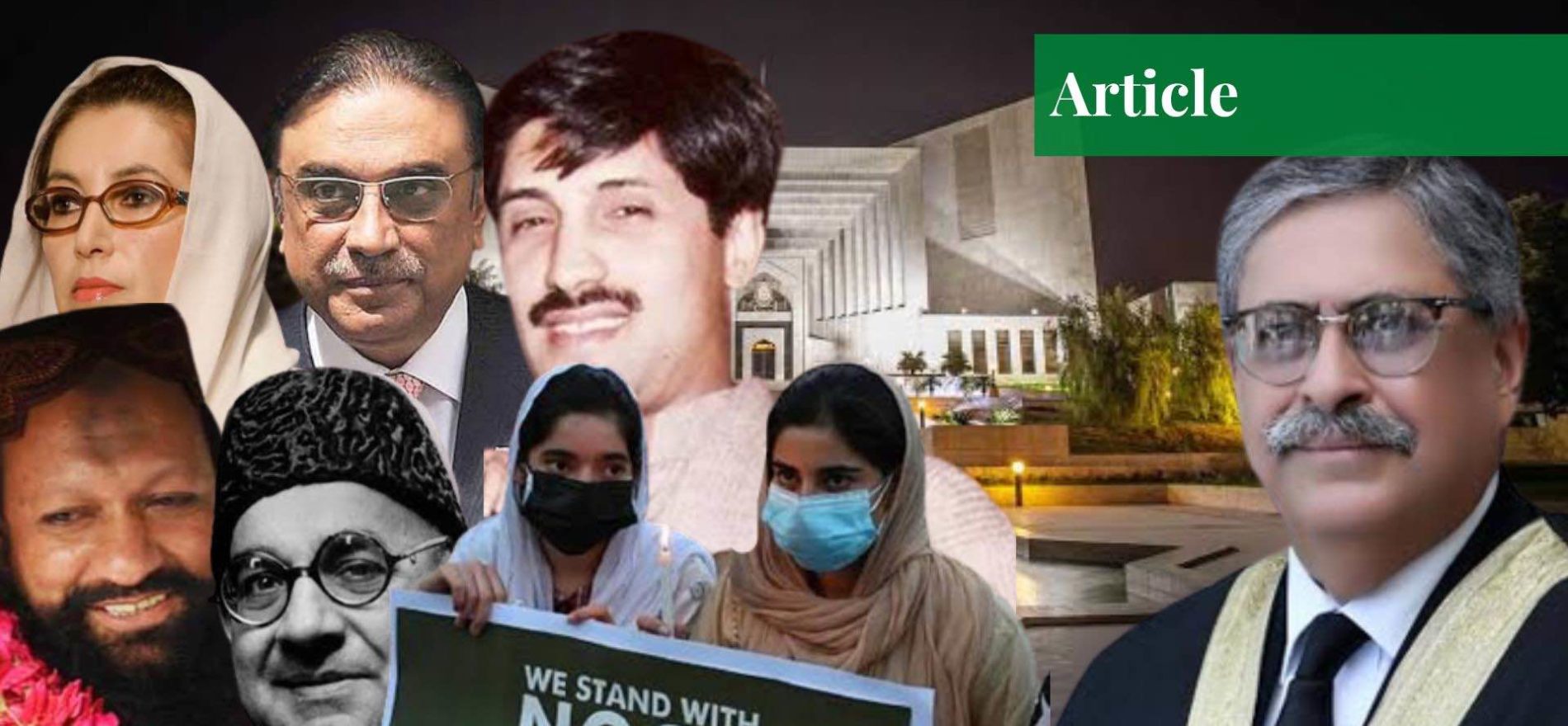The Noor Muqaddam Case
On 20th July 2021, horrifying news of the brutal murder of a 27-year-old woman spread across Islamabad. As the facts unfolded, it became known that the murderer was Zahir Jaffer, a friend of the victim and the son of a wealthy businessman. Conventional attempts (such as blood money) were made to rescue the accused from legal proceedings in the criminal justice system of Pakistan.
However, the father of the victim, Shaukat Muqaddam, a former Pakistani diplomat to South Korea and Kazakhstan, remained steadfast in his decision to demand justice for his daughter. The Noor Muqaddam case, one of the country’s most high-profile murder cases, was a challenge for the criminal justice system of Pakistan.
It has now been 11 months of hearings, physical remands, confessions, forensic tests, bail pleas, protests, and vigils. The case met the usual hurdles that were catered to impede the proceedings. The suspect was deemed mentally unstable, and his counsel requested a medical board. The request was denied, as the jail doctors declared him medically fit.
The lack of eyewitnesses was another hurdle, as the justice system cannot entirely rely on circumstantial evidence. The verdict of the Noor murder case was pronounced by the trial court. The court sentenced Zahir Jaffer, the main accused, to death. Furthermore, the court sentenced the co-accused Zahir Jaffer’s employees, Jamil and Iftikhar, to 10 years in prison.
The case is now with the Islamabad High Court and will undoubtedly face more details before justice is finally served – if at all. Was Noor’s case given priority because of the mounting public pressure? Was the determination of Noor’s parents to get a successful verdict from the trial court fruitful because of their influential position in society?
The Unscathed Malik Ishaq
One of the most crucial questions from the criminal justice system of Pakistan is – does the prosecution show a similar attitude towards the cases that steer no public attention? Confessions to 11 murders. Corroborated involvement in more than 57 murders. Sundry acts of banditry. All these crimes have been committed by a single person – the leader of the militant group Lashkar-e-Jhangivi, Malik Ishaq.
Fida Hussain, a proletariat brave enough to testify against Malik in charge of killing 12 members of his family, witnessed his life turning into hell because of Malik’s influential position in society. Malik Ishaq unleashed his ability to threaten and mould the criminal justice system for his own benefit every time he was arrested or when the state took action against him.
The vicious cycle of Malik Ishaq getting arrested/warranted, killing witnesses, threatening judges, and getting released continued until he was killed along with his two sons in a shootout at Muzaffargarh on 29th July 2015. The dilemma is, as portrayed through the case of Malik Ishaq, that you cannot stop a brutal criminal in Pakistan by enforcing the criminal justice system until you get them killed in a shootout.
Rogue Juveniles
Is it what we want our criminal justice system to look like? Powerless and vulnerable to exploitation by petty non-state actors. Jazlan, a 19-year-old boy, was shot dead in Karachi just because he told someone to drive safely. The evidence is there, suspects are under police custody, and the case is one of the open-and-shut kinds of cases. However, somehow, Pakistan’s criminal justice system cannot deal with it.
The suspect’s father, whose gun was used at the crime scene, was released shortly after being arrested because he provided an alibi. The main suspects are being prevented from facing the consequence of their actions by toying with the legal concessions of the Juvenile Justice System Act 2018. The lawbreakers and delinquents seem more experienced in exploiting the law than the criminal justice system in making righteous use of it.
Innumerable Cases
Such comprehensible cases are the most challenging test of the justice system’s competence, and Pakistan’s criminal justice system has been failing this test continuously. Apart from these murder cases that at least face trials, the criminal justice system of Pakistan has left behind a legacy of unsolved mysterious criminal cases.
Mohtarma Benazir Bhutto Shaheed, was her assassination related to Mustafa Abu Al-Yazdi, Al-Qaeda’s commander? Or was Mehsud responsible for her murder? If you have followed the so-called investigations of her case, you would know she suspected Pervez Musharraf of planning her murder, which she mentioned in her emails to David Milliband. On the other hand, many conspiracy theories claim her husband killed her.
From unsolved cases of Liaquat Ali Khan, Hakim Muhammad Saeed, and Omar Asghar Khan to the untimely and inexplicable deaths of Dr. Rizwan, Nadeem Akhtar, and Imran Abbasi, the only consistent trait exhibited by Pakistan’s criminal justice system is passiveness. According to a UNDP (United Nations Development Program) report, 43% of the cases filed in Pakistan take 5 to 10 years to be resolved.
Is this an acceptable duration for justice to be served? Further studies of the same report indicate that under-trial prisoners fill the ⅔ population of jails. Though many of them would be criminals, the ones who are innocent and waiting for their trials, waste the precious years of their lives in prisons because of the delayed justice system. The apparent reasons for delays include the non-appearance of witnesses at the hearing.
Usually, judges don’t penalize the non-appearance of witnesses. Also, the absence of criminals is very common and supported by excuses, such as the shortage of vans, closure of roads because of protests, criminal counsels not being notified on time, etcetera. A similar delay also occurred in Noor’s case when Zahir was not presented before the court because of road closures. However, the suspect was investigated on Skype.
This discussion calls to mind the case of Brig Asad Munir, a former intelligence officer and analyst who was falsely accused of corruption. He was unable to handle the public shame that he faced and ended up taking his own life in 2019. His final letter to the Chief Justice stated: “I am committing suicide to avoid humiliation, being handcuffed and paraded in front of the media. I am giving my life in the hope that you the honorable Chief Justice will bring positive changes in the system where incompetent people are playing with the life and honor of citizen in the name of accountability.”
Justice in Pakistan
In its 2021 index, the World Justice Project ranked Pakistan 130 out of 139 countries in adherence to the rule of law, which is by no means acceptable. With Shariah being implemented in our country, Pakistan is supposed to offer an unbiased justice system. Our justice system knows how to punish criminals, but the process has been made onerous by introducing unnecessary legal requirements.
Article 25 of Pakistan’s constitution ensures equality before the law. However, the criminal justice system in Pakistan is by no means offering equality to those at the lower ends of the power hierarchy. Justice is at the far end; many victims cannot even get the FIR lodged. If they manage to do so, the vicious cycle of court hearings and legal proceedings further shakes their confidence in the criminal justice system.
This scenario does not even take into account the hurdles they face if the opposing party is influential. However, the real problem arises when the rule of law is not allowed to cross the theoretical boundaries and its practical imposition is impeded. Here, all we need to do is ensure the justice system exercises freedom from the dominant strata of society.
From an optimistic point of view, we can hope Noor’s case is the harbinger of change. Though it can instigate the criminal justice system to opt for self-accountability, there is a long way to go. We can celebrate a small victory in the Noor Muqaddam case because of the trial court’s verdict, but the road to true justice seems infinite.
There are still a lot of people out there demanding justice, whose families are not as influential as Noor’s. There are still a lot of cases that don’t receive massive media coverage and it is the responsibility of our criminal justice system to ensure the fair trial of every single criminal case – even the ones that don’t claim public attention.
If you want to submit your articles, research papers, and book reviews, please check the Submissions page.
The views and opinions expressed in this article/paper are the author’s own and do not necessarily reflect the editorial position of Paradigm Shift.



















